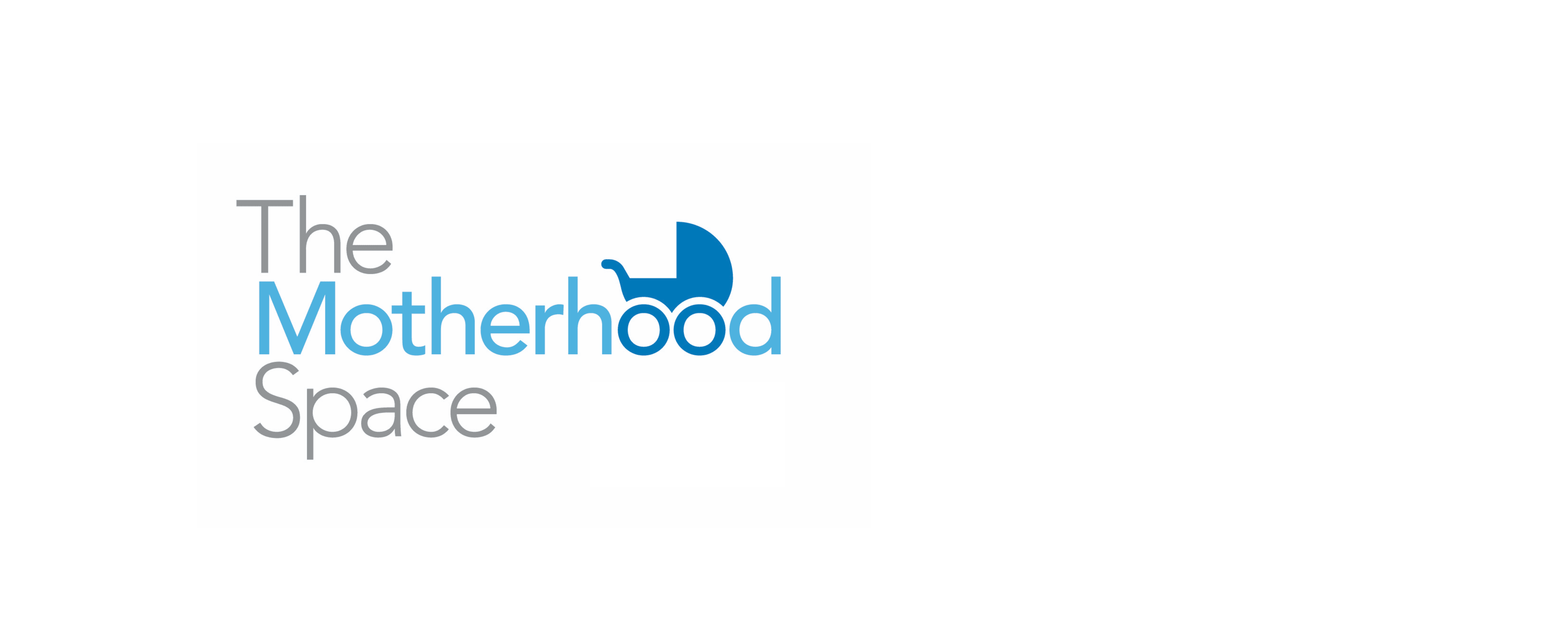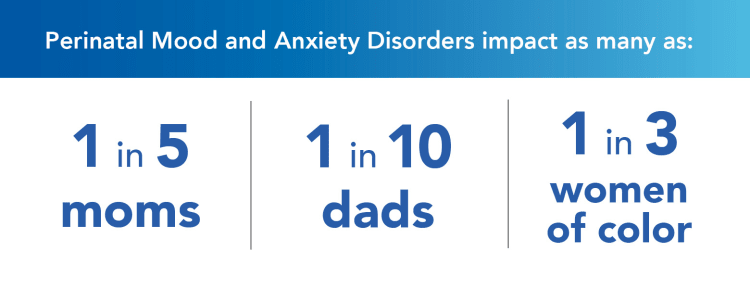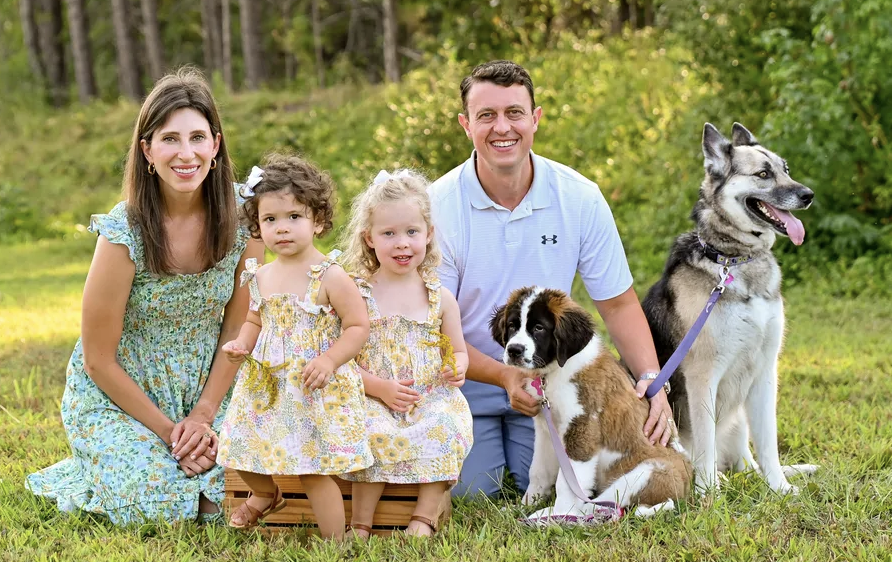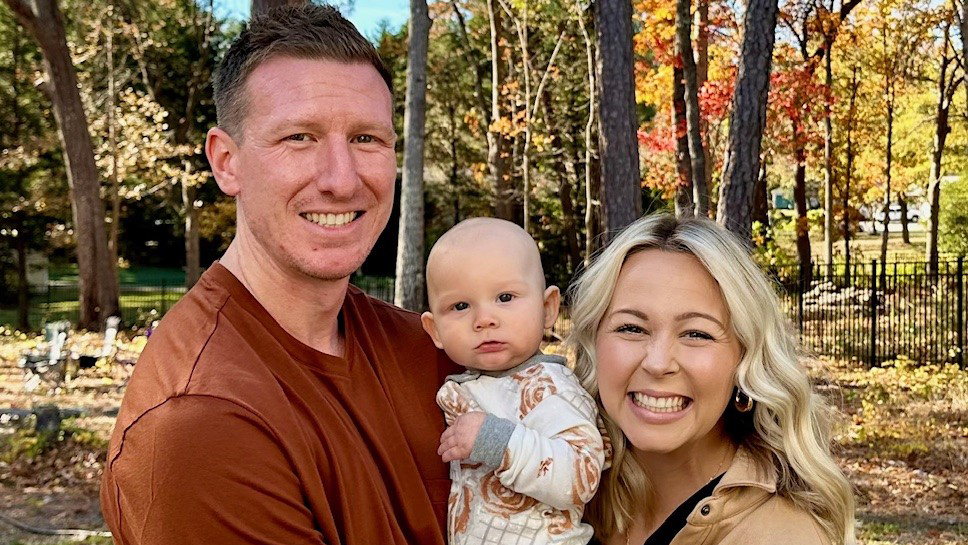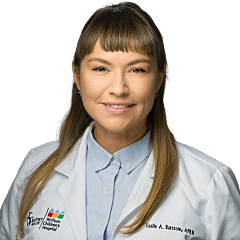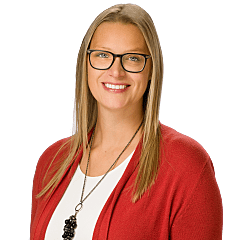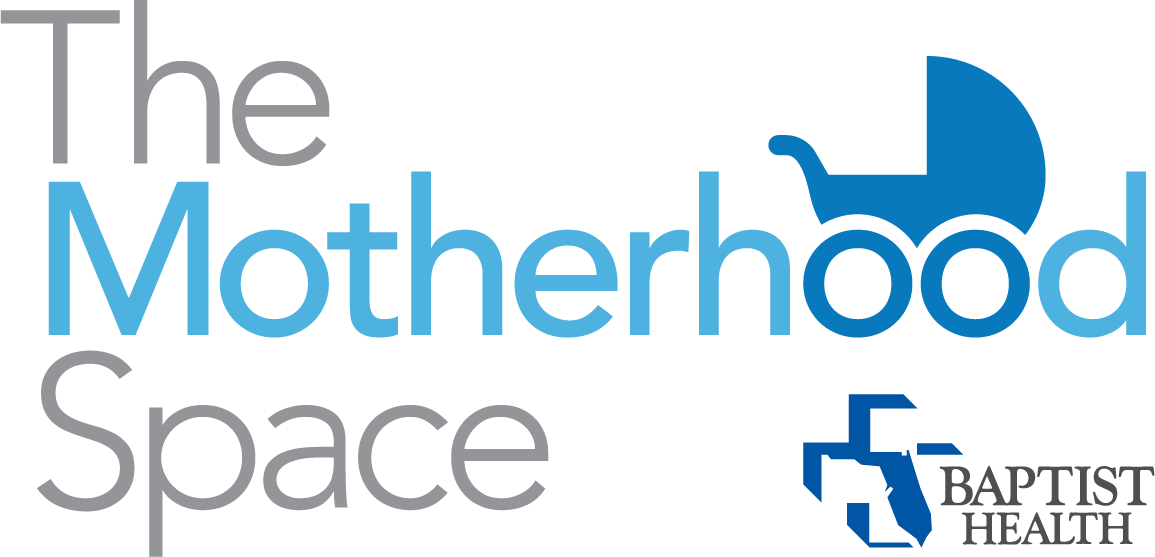Transcription:
Jill Garrett: Welcome to Hindsight is 2020, a Motherhood Feels podcast? I'm Dr. Jill Garrett, a licensed psychologist who specializes in perinatal mental health and host of Hindsight is 20/20. In a departure from past episodes, in this episode, we will dive deep into another support for moms and families in which I'm involved. The Motherhood Space Day program at Baptist Health in Jacksonville, Florida. Listen in to hear the genesis of The Motherhood Space. Meet six incredible moms with whom I have had the honor and privilege to work, and listen to some motherhood moments from a reunion group of alumni moms from the program. All of that and more, next.
Okay, so it's me, Jill, and before we get started, let me share a little backstory. So, when I had my own daughter nine years ago, I noticed that there really wasn't much in the way of emotional support for moms. I'd go to my OB appointments and the staff might say, you're feeling fine, right? And then they'd move on to the next patient. But I was not always feeling fine. In fact, in those first months after having my daughter, I was super anxious that she would die in her sleep. And this fear was amplified by the fact that I had a brother who had died of SIDS, sudden infant death syndrome, making this fear feel closer to home. Fortunately, I had support. And here's the thing. We know that support works. We know that the gold standard is to have people who are trained in pregnancy and postpartum mental health support our moms. We know that evidence-based treatments, so treatments that research shows that work and medications, or a combination of those two, work to help get moms back to feeling like themselves. But we also know that emotional challenges during the pregnancy and postpartum period are super common, and that supports for moms and dads and families are just not that common. So, check this out. Over 600,000 birthing people a year in the US will experience emotional challenges during pregnancy and postpartum. Let that number sink in. That's as many as one in five moms. And in some groups of moms, particularly groups of moms that are from underserved areas, it might be one in three moms who are experiencing emotional health challenges. With those numbers, it means we not only have moms who are suffering, but we have babies and children who are suffering as their caregivers’ struggle. We have people missing from school, from the workplace, from their community as they struggle. So, it's not just a mom issue, it's a public health issue.
Ava: So those numbers and that impact, that probably means there are a lot of places where moms can get support, right, mom?
Jill Garrett: Oh, hi. Nine-year-old daughter, Ava.
Ava: Oh, hi.
Jill Garrett: One would think that, but nope. In fact, in the United States, there are only about 30 mental health day programs that are identified as intensive outpatient programs for new and expectant moms.
Lila: Wait, only 30, mom?
Jill Garrett: Oh, hi. Six-year-old daughter, Lila.
Lila: Oh, hey.
Jill Garrett: Hi. Yeah, only 30 seems a little strange, right?
Lila: Yeah, we gotta do something about that.
Jill Garrett: Yeah, I thought so, too, guys. So back to my story. Once I settled into work after maternity leave, another psychologist and mom colleague and I approached leadership at our hospital system to advocate for initiating a maternal mental health program. As psychologists and moms, we knew that more needed to be done.
Candice Franco: I'm Dr. Candice Franco. I'm a mom of a ten-year-old girl and an eight-year-old boy, a colleague of Jill's. And I've had the pleasure of partnering with Jill to build the maternal mental health program at Baptist Behavioral Health.
Jill Garrett: We were fortunate to have the support of our healthcare system, and the maternal mental health service line at Baptist Health was born. We were helping people. They were getting better, but still, we knew we needed more. So, let's backtrack. A few years ago, one day, I sat down and drew up a document of what I felt like could be a comprehensive way to support our community around maternal mental health. Tier one, education, and resources for our healthcare providers who interact with new and expectant moms. Tier two, a no-cost social media channel that provides brief video vignettes on hot button topics and strategies for healthy coping in pregnancy and postpartum. And tier three, the Piece de Resistance, a group-based mental health day program for pregnant and postpartum moms. Again, with the amazing support of hospital leadership and the dedication and support of a great team over the past years, this three-tiered plan that I envisioned is now a reality. It even has the name that I workshopped on my family group text thread, The Motherhood Space. Every detail of this programming was created with moms in mind. What do I wish I had had? What do I see moms need more of? We need a no-stigma zone. We need little to no wait times. We need no-cost childcare. We need people who specialize in this field. We need wellness. We need movement socialization. We need care that works. We need scholarships for moms who could use financial support. We need to be able to mother the mother. Joining forces with me to mother the mothers of The Motherhood Space is my colleague, Doctor Jeanette Thames.
Jeanette Thames: Hi, I'm Dr. Jeanette Thames, twin mom, and perinatal psychologist. My passion for the maternal mental health field grew from my own transition to motherhood when I learned that the reality of becoming a mom to multiples was much harder than I ever expected. Despite all my training and education, to say that it was a humbling experience would be an understatement. Luckily, I found good support and ultimately it led to the opportunity to team up with Doctor Garrett to support some awesome women at The Motherhood Space. Opening the doors to The Motherhood Space Day program means moms have a place to get support three days a week, 3 hours a day, in a space that is inviting, has childcare, a private lactation space, a relaxation zone with a massage chair, a 30-day guest pass to a state-of-the-art gym facility, providers that specialize in maternal mental health and programming that is engaging, creative, wellness-inspired, and most importantly, care that works.
Jill Garrett: So, remember those 30 mental health day programs for moms I mentioned? Now our hospital system has added one more. And not to toot our own horn or anything, but I will. The Motherhood Space Day program is the only pregnancy and postpartum specific wellness-inspired program with all these unique features in the country.
Ava: So, 30 plus one means there are about 31 mental health day programs that are now available for new and expectant moms. That's a great stomp, mom. Keep trying. Can I do that? Yeah, that's a great start, mom. Good job.
Jill Garrett: Okay, so I'm one of those annoying people who really likes their job. I look forward to work. I'm upset if I have to miss work. I enjoy talking about work, like, a lot. I'm currently recording a podcast about work. But here's the thing. I don't feel like work is work. I don't feel like the patients with whom I work are patients. They are more like awesome women who I get to witness get better. It has been so rewarding to see moms at The Motherhood Space enjoy this programming that. That I wanted to feel more like a spa than a hospital service. With a menu of group therapy services and all the unique offerings like trauma-informed yoga, walking therapy, art therapy, those perks are awesome.
But here's the reality. Being able to have a no-judgment space with other moms allows people to know that they're not alone. And knowing programs like the Motherhood Space exist allows moms and families to recognize that with help and support, you can experience relief and you can feel better. On this episode, I'm excited to introduce you to six resilient and remarkable moms, all of whom I have had the honor and privilege to work with at the Motherhood Space Day program. Yes, these women are all moms. Some are expecting babies, and some have recently had babies. But it's also important to know that all these women share other extraordinary qualities. Insight, courage, a willingness to be vulnerable, not only for themselves, but for their families. And now for you, as they share some of their mom moments with you.
Anastasia: My name is Anastasia. I have a six-year-old, soon to be seven-year-old son and a one-year-old.
Sara: My name is Sara. I'm about seven months postpartum now.
Tori: My name is Tori, and I am currently pregnant with a little girl. I am 28 weeks pregnant, and I have a 19-month-old little boy at home.
Annemarie: My name is Annemarie, and I'm a mom of two sons, a seven-year-old, and a 16-month-old.
Victoria: My name is Victoria. My daughters are twins. They're four months old at this point.
Hannah: My name is Hannah, and I have a three-and-a-half-year-old, and I am 38 weeks pregnant today.
Speaker G: So, I have always wanted to be a mom. I wanted to be a mom of, like, five, but I think we're good with, like, two, maybe three. I have to convince the husband.
Speaker E: I've always known I wanted to be a mom, but it wasn't, like, for, say, on my mind. I was focused on, like, just living, so it was a shocker, but I kind of knew I was gonna be a mom.
Speaker H: I've always wanted to have a family. I've always wanted to be married. I always wanted to have kids. I've always wanted to be a mom. I just didn't know how it would happen.
Speaker F: Everyone else had different goals in life, and I always just wanted to be a mom. When I thought about being a mom, I thought it was gonna be just light and love and positivity all the time and just really making sure that the baby was the focus of everything. The adjustment to being a mom was definitely a lot rockier and more intense than I thought it was going to be. It made me realize a lot of things about life and about myself that I didn't even see coming ahead of becoming a mom.
Speaker I: I expected it to be natural and easy, simple. Oh. The reality of being a mom has been the opposite. Challenging, rewarding, and not simple.
Speaker E: Before being a mom, I just thought it was going to be this perfect fairy tale. It was going to be a breeze, going to be easy, and just every day, I was just going to wake up and be this perfect mom.
Speaker G: I thought mom life would be extremely easy and fun, and there wouldn't be any rough times. I knew there would be ups and downs, but I never thought it would be hard. The adjustment to becoming a mom was not as easy as I expected it to be.
Speaker F: Postpartum, for me, was a lot of anxiety, self-doubt. I think the trickiest thing was kind of having that inner monologue the whole time, whether it was anxiety or depression, it was just being home alone with this infant that you can't really communicate with. It was just a lot of talking to yourself and self-doubt and just kind of going over everything in your head over and over and over again until you didn't even know what weight was up anymore.
Speaker G: So, my reality in the postpartum period was extreme anxiety. And with that anxiety came extreme depression.
Speaker H: The hardest feelings that I felt before coming to the motherhood space would be the feeling of, I'm the only one. And that loneliness, depression, for me, felt.
Speaker E: Like my world was just over. I felt hopeless. I felt as if I was failing myself and letting my children down. So it just. It wasn't a good place. I didn't feel good at all.
Speaker I: I usually have a lot of joy in my heart. And with this pregnancy, I found that I didn't have as much joy as I normally do. My husband and I talked about it, and he said, you probably need to talk to somebody. I talk to my midwife, and they said, you should check out Motherhood Space. And I said, you know what? I think you're right.
Speaker H: So I went to my postpartum checkup early, and I learned about the Motherhood Space because I went two weeks after the girls were born, and they did it a little early for me because, number one, I had preemies, and the girls had just come home, and they wanted to see how I was adjusting, and they saw that my depression anxiety levels were elevated, and they recommended the Motherhood Space.
Speaker G: So ahead of the Motherhood Space, I had actually been speaking with my OB GYN in regards to getting on a medication, and I knew that was not the route I wanted to go because I had done it prior. I knew there was something else, and my doula actually told me about this program, and she said it would be something that she thinks would be amazing for me.
Speaker E: So when things got really, really hectic for me now after having my daughter and I started having those anxiety attacks, I mentioned it to my doctor, and he was like, oh, we have this Motherhood Space. So I found it through my doctor, but through my voice as well, me actually voicing what was it I was seeking and what I needed help.
Speaker F: I found the Motherhood Space. I think initially I was told by the hospital when I had the baby, and I was like, okay, that's great, and I was gonna look into it, and then you get sidetracked with the baby. So a few months later, when I was realizing the toll on my mental health that was happening, I told my OB Gyn, and they told me again about the Motherhood Space and put in a referral. My worries and concerns ahead of this were that I was gonna be judged by the other moms or judged by the facilitators that kind of, like, my thoughts were bad and that I was the only one kind of going through this and that it was just scary to kind of be vulnerable with certain things, especially when you don't want to sound like a bad mom and you're scared that you're going to say the wrong thing and then authorities are going to get called in or that the bad thoughts that you have or irrational feelings are a lot more dangerous than you think they are.
Speaker I: When I first entered the Motherhood Space, I was excited, actually. I wasn't really scared, and I wasn't really anxious, to be honest. I was more excited because I felt proud of myself for being able to step out and do something unlike my first pregnancy. And I was just looking forward to.
Speaker G: Doing something new, not the type of person that talks about her struggles in front of people. I like to put a mask on and just happy go lucky. Everything is positive. So that was one of the biggest worries going into this for me. And I wanted so bad to see someone specifically for postpartum, you know, for being a mom, like, really struggling with those. And when I couldn't find anything, I just kind of dealt with it on my own. So it made me so happy to know that there is a program out there. I wish it can be everywhere for all the moms in all the states.
Speaker E: I was so anxious. I felt so nervous. I felt like I couldn't do it. I would talk myself out of it. A lot of times. It took me quite a few days to actually come to the first session because I was just like, no, I can't do it. Can't do it. I don't want to think of me bad, or I don't want to present myself as being weak. My first impressions on being there was, oh, my goodness, this is amazing. Whoever thought of this was just amazing. I never saw a space for mothers to really be vulnerable, be loving, and be caring and attentive to other mothers. Being able to speak about the hard times in being a mother or parenting that we don't really get to talk about just because we're put on a pedestal of a mother, of not being able to express yourself in a certain aspect. So it was amazing for me. I would do it all over again. I would keep doing it all over again.
Speaker I: So I think the number one thing that I really appreciated about the whole program was the gentleness that I was shown because I've never done therapy before and I've always been for it. I just never had the courage to do it. And of course, being in a group space can potentially be more stressful, but actually helped me feel better because I wasn't just spotlight on me, but I really loved the gentility of it, of walking into the place and not having someone point the finger and accuse me of being a bad mom or just being just not right, you know? And it kind of reminded me that I need to be gentle to myself.
Speaker H: So the first day I came in, number one, I was trying to get the girls out of my car, and it was the first day I had actually used my twin stroller, and I had to learn how to open the stroller, get the girls inside of it by myself, clicked in and safe and everything. Also, did I mention I brought two and a half month old twins to a therapy session with a bunch of new people? Things that people said I probably should not have done. And I had to ignore all of that because I knew I needed help. And when I came in, I felt so much love and non-judgment because I pushed my little Cadillac stroller in and I pushed it through the room and people moved things out the way for me. They asked me if I needed help. They asked me was I comfortable. They lended a hand with anything and everything. They told me where I could safely change the girls and things of that nature.
Speaker F: When I got to the Motherhood Space, I noticed that it was really open and calm, and both you and Doctor Thames were very open and very welcoming, and it just felt like a very positive light experience. The anxiety kind of went out the door immediately, as soon as you walked through, because everything was just very calm, very welcoming, quiet, accepting. It was a really nice place. You kind of felt like you could breathe for the first time.
Speaker I: My doula, we were talking and I told her that I was going to Motherhood Space. And she said, well, what's the number one thing that you liked about it? And I was like, oh, one. I have to choose one. They're all such good, good things. And I'd be like, oh, no, she's trying to get brownie points. But I said, psychologists. I was like, they were exactly what you would expect a psychologist to be. I was like, they were knowledgeable and approachable and just overall, exactly how I would expect someone to lead me through an emotional situation with. So it was cool.
Speaker G: My first time at the Motherhood Space, it was kind of a surreal moment. It was almost like, okay, yes, you're nervous to be here, but look around you, all of these moms are nervous to be here. It's not just you. And they're going through the same thing. You are, so you are not alone. So it was actually a very scary, but also very warm moment for me.
Speaker F: What I would tell someone who's hesitant about reaching out for support is that it's worth going and taking that step and being brave and putting yourself and your mental health forward. Because if you can't even think about putting yourself forward, think about doing it for your child, because it does make a huge impact on how you parent.
Speaker G: So I would describe the Motherhood Space to all of my friends as a, you must do it, because I was petrified in the beginning. I genuinely was. But now I have become obsessed that I just want to keep going because you just, you learn so much and you learn how to do things just day to day. And it's extremely helpful because there's so many different things that can happen with being a mom and you never know what's going to happen. So it's nice to be able to have a group of people to kind of go back and talk to.
Speaker H: If you're hesitant to reach out for support, I would dare you to ask the question why? And really be honest about why. Like, why are you afraid to do something that's good for you? If your leg was broken, no one would look at you crazy for going to get help for that. And actually they would wonder why you haven't gone to seek help.
Speaker E: I would say take the risk, take the step for seeking your mental, your health and you becoming the best mom that you know you can be.
Jill Garrett: Now hop into a short sample of a recent reunion group of these Motherhood Space moms. What you can't see are the sweet babies that are usually in mom's laps, but you can listen in to the camaraderie and connection that all these moms now share. We're so glad that you're all here and we want to think through a couple of different concepts in this group tonight. And one of the first ones is this idea about expectations, about parenthood and then the reality. And as you all know and have experienced, oftentimes there is a bit of a disconnect or our expectations are a little different from the actual reality.
Speaker H: Absolutely agree.
Speaker D: We're going to walk through a little exercise, and so we'll throw out a few themes that are common for expecting moms and just what they expect pre becoming mom and then reality based. So let's start with feeding. When working with expecting moms, oftentimes they will think that feeding baby will be just this little sinful natural as moms who have gone through it or are in it, what has the reality really been like?
Speaker F: A nightmare.
Speaker B: Where to start?
Speaker F: My son had a tongue tie, so he wasn't able to latch on. And I became like the poster child of everything that could go wrong with breastfeeding. And it was hard to, like, let go of it. But then once I did, I was so happy with it. I was like, this is. I do not need to deal with any of that. I should have just went the formula straight off the boat.
Speaker D: Have some relief.
Speaker F: Yeah.
Jill Garrett: Yeah.
Speaker H: As a twin mom. So the first 24 hours I did not see my girls because they were NICU babies, and one of them was having issues breathing. The other one was having some issues with receiving the feeding or anything like that. So, I didn't see them for 24 hours, which made it harder for my milk to actually start and for them to, like, connect with me so that I could start breastfeeding. So, it took about a week and a half for my milk to even kind of start and when I started really pumping and trying to pump, power pump and everything like that, I was basically getting about an ounce of milk for two babies, and I was doing that every 2 hours, every 3 hours, and trying to feed them and supplement with formula. And after about a week of that, I started losing my marbles a little bit. And people kept saying, oh, you just gotta keep trying. But I feel miserable, and I'm not sleeping, and they're both crying at me. And I just decided that it was probably mentally more stable for me to stop and just give them formula, because I was like, I can either sacrifice my leap insanity to basically cater to what I thought I should be doing. That's one of the things we talked about, is not shooting ourselves and not saying, this is what I should be doing versus what can be done and what is available.
Jill Garrett: So, I agree with you, I like the way you pointed out that permission to switch gears, which is oftentimes hard. I saw you nodding over there, Hannah, about the breastfeeding challenge.
Speaker I: Yeah, it was similar for son. He had to go into the nursery too, for a couple of days. And so we did both. We did breast and bottle, which in the reality, it was. It was fine. It worked out okay. Our thing was reflux, so it wasn't so much him not getting the nutrients that he needed.
Speaker C: It was huge.
Speaker I: Not calm down, couldn't lay him down. And it was gastrointestinal issues, which actually has gone on through his life. And now that I know these things, like, okay, I'm gonna be better prepared for this little one. Like, low expectations for this one. But that was hard. Yeah, it's definitely hard.
Speaker G: I'm, like, a little opposite. I feel like breastfeeding is kind of what saved me in my, like, beginning journey, because it was the only thing that I could do, you know, if that makes sense. Like, that was the one thing that I was blessed to be able to do. And so as hard as it was, because, you know, you're the only one that can feed him, it is what saved me and where I was at in the beginning of motherhood.
Jill Garrett: Interesting to hear different perspective and how everybody comes to the table with some differences in all of this.
A special thank you to Anastasia, Ann Marie, Hannah, Sarah, Tori, and Victoria, all of whom are amazing moms and strong, powerful women. If you're interested in learning more about the Motherhood Space and other supports for moms and families, check out the show notes for links. Thanks for listening. Information on hindsight is 2020 is intended for general education and informational purposes. Engagement in this podcast does not constitute a professional relationship, and this content is not intended to be an alternative or substitute for professional psychological support. Individuals are encouraged to pursue that through a licensed healthcare provider. If you're experiencing an emergency, please report to your closest emergency department or contact 988.

